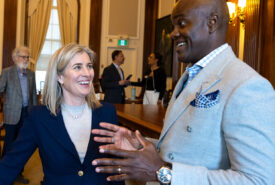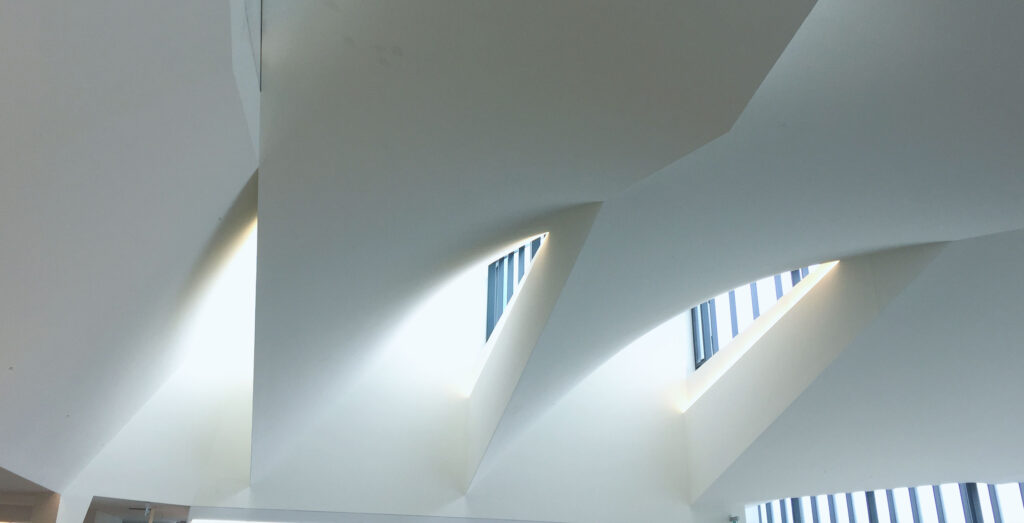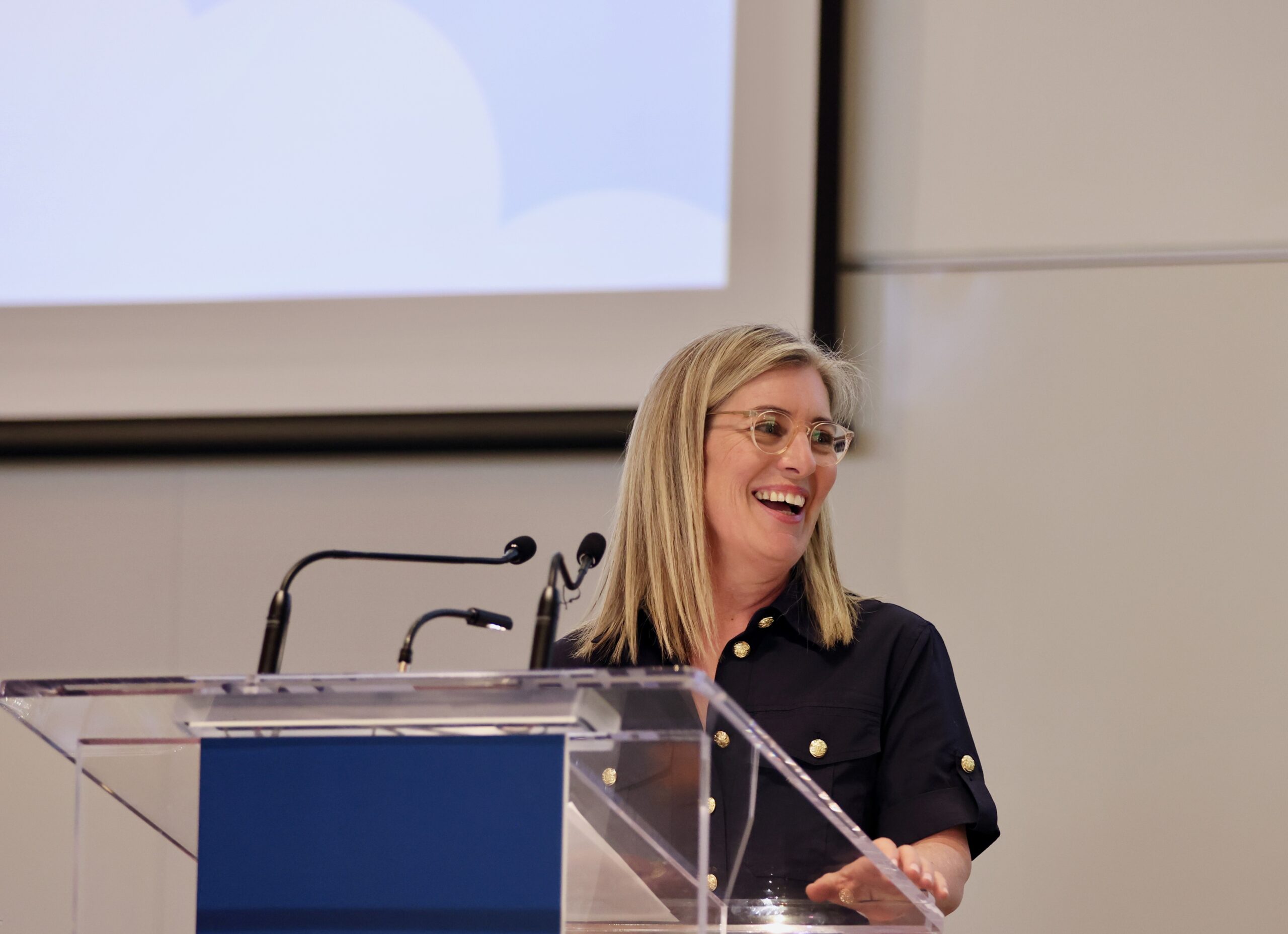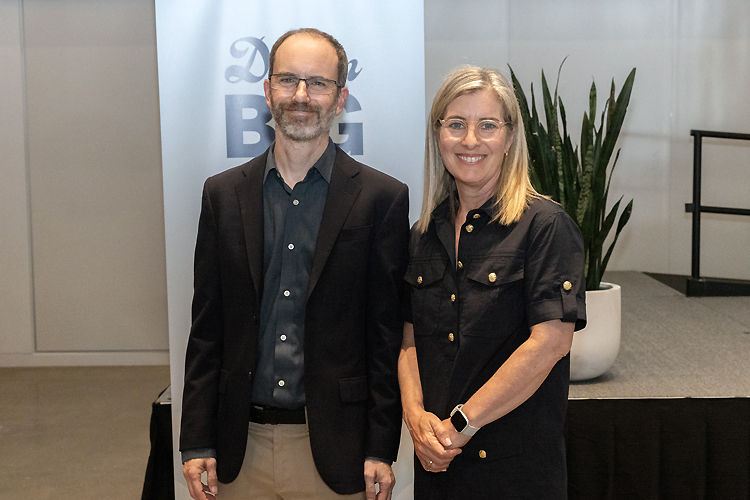In photos: Melanie Woodin’s first 48 hours after being named U of T’s president-designate



As dean of Arts & Science, Professor Melanie Woodin led U of T’s largest faculty through COVID-19 and a time of growth — advancing research, equity, and collaboration. On July 1, she becomes the university’s 17th president.Photo credit: Diana Tyszko.
During her tenure as dean of the Faculty of Arts & Science, Professor Melanie Woodin guided the University of Toronto’s largest faculty through the challenges of COVID-19 and a period of significant growth and renewal — advancing both research and research collaboration, deepening the faculty’s commitment to equity and inclusion, building meaningful partnerships, and enhancing the academic experience for students and faculty alike.
“From the beginning, I endeavoured to bring the faculty together, to have people from different disciplines collaborate on complex problems,” says Woodin, who becomes U of T’s 17th president on July 1.
“I was also motivated by community building. I wanted people to feel a sense of belonging to Arts & Science; to know that all scholarly disciplines are highly valued — and to really be inspired to be part of this great place.”
Woodin’s journey began in the 1990s as an undergraduate in the very faculty she would come to lead. Sitting in Convocation Hall, she listened to a professor outline the pathway to becoming a scientist: undergraduate degree, master’s, PhD, postdoctoral fellowship.
“My friend and I both started quietly giggling,” recalls Woodin. “At the time it sounded kind of preposterous that you would spend that long in university.”
Yet that academic journey became her life’s work. After earning her degrees, Woodin returned to Arts & Science in 2004 as an assistant professor. She served as associate chair in the Department of Cell & Systems Biology; director of the Human Biology Program; associate dean, undergraduate issues and academic planning; vice-dean, interdivisional partnerships; and was appointed dean in 2019.
In one of her first initiatives as dean, Woodin held brainstorming sessions with faculty members, staff and students from across the faculty. Their feedback formed the foundation of the 2020-2025 Academic Plan: Leveraging Our Strengths.
“There was an overwhelming, clear message: imagine the potential we could unleash for student learning and research if we truly embraced interdisciplinarity,” says Woodin.
“I believe we’ve achieved that together, and I hope it’s the legacy of my leadership.”
The plan laid out transformative initiatives for tapping into the faculty’s remarkable breadth, capitalizing on its strengths to provide exceptional student experiences, foster innovation in teaching and research, and nurture and promote the achievements of world-renowned faculty.
And then a global pandemic happened.
Just months into her tenure, Woodin found herself overseeing a closed campus with no in-person classes, labs, or convocation ceremonies — and few of the usual opportunities for students to connect, collaborate and build the sense of community that defines the A&S experience.
“We immediately identified the experts in our faculty who were already engaged in pedagogical innovation in online learning and appointed them to leadership roles,” says Woodin. These efforts formed the basis of the faculty’s Digital Learning Strategic Framework.
Most disheartening for Woodin though, was being separated from the community she cared about. One night at home, she pulled out her laptop and wrote the first of many pandemic messages that would define her warm and supportive leadership style.
“I remember the first one I wrote after my kids had gone to bed,” says Woodin. “I knew everyone was struggling and wanted my Arts & Science family to know how much I was thinking about them. Every time I wrote a new one, it kind of refilled my tank too.”
When students returned to campus in fall 2021, Woodin accelerated the academic plan priorities. Her leadership played a key role in several important institutional partnerships, including A&S involvement with the Acceleration Consortium, which received the largest federal research grant ever awarded to a Canadian university, and establishing the Data Sciences Institute.
She launched the Arts & Science Internship Program (ASIP), providing students with paid work opportunities and professional training.

Under Woodin’s leadership, between 2019 and 2024, internal research funding increased by 134 per cent and private sector research funding rose by 34 per cent.
She also enhanced academic programming, honouring the faculty’s pledge to prioritize Indigenous research, teaching and learning. The faculty also elevated the status of several units including the Centres for African Studies, Caribbean Studies, and Indigenous Studies.
Woodin has also met with alumni around the world throughout the university’s Defy Gravity campaign, the largest fundraising and alumni engagement initiative in Canadian history. A&S has raised $400 million during her tenure.
“Alumni constantly tell me even though U of T was academically demanding compared to other schools, that rigorous experience gave them a huge advantage,” she says.
Throughout her time as dean, Woodin cultivated strong connections with all students. She took every opportunity to engage directly with them, such as handing out treats in front of Sidney Smith Hall exchanging her own personal stories and hearing from them about their classes or research. She participated in the new “Dean for A Day” — initiated by the Arts & Science Students’ Union — trading places with undergraduates to remember what it’s like to be in their shoes.
Woodin believes it’s important to listen and lead by example, and make sure you have fun along the way. “You have to find joy in your work through the relationships you build and celebrate others’ successes,” she says.
Known university wide as an open and accessible leader and authentic champion of inclusive excellence, Woodin will continue to build on her legacy and vision as U of T’s next president.
“We’re in an exceptional position as one of the top 10 publicly funded universities in the world, but personally, I feel like we’re number one,” she says. “We’ll begin our third century in 2027 and it’s an extraordinary opportunity for all of us to dream big.”
–

